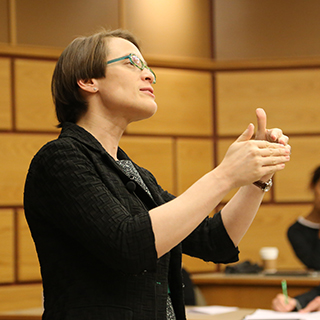Tales of a Corporate Idealist
Christine Bader, author of The Evolution of a Corporate Idealist: When Girl Meets Oil, delivers 2015 Day Family Ethics Lecture at Johnson

Christine Bader, author of The Evolution of a Corporate Idealist: When Girl Meets Oil, delivers 2015 Day Family Ethics Lecture at Johnson

by Jay Wrolstad
Corporations can and will do the right thing, says Christine Bader, but that requires executives willing to weigh both profits and principles — especially when things go wrong — and patience on the part of those demanding greater social responsibility among the world’s biggest firms.
Bader, in delivering the 2015 Day Family Ethics Lecture at Johnson on April 7, focused on the findings in her book The Evolution of a Corporate Idealist: When Girl Meets Oil. It’s a story about forging an impactful career while recognizing that business must be a part of global solutions, she said.
That career started in the public sector, including stints in AmeriCorps and the New York City Mayor’s Office, followed by an MBA from Yale and nearly a decade with oil giant BP. More recently, Bader served as an adviser to the United Nations, developing standards that delineate business’ responsibility for human rights.
When she joined BP as an analyst examining the social impacts of the company’s projects in the developing world, Bader said, “I was pleasantly surprised by an internal debate on the responsibilities of the company in the communities where it operates.” With support from BP executives, she brought corporate responsibility to the forefront with positive outcomes at energy development projects in Indonesia and China that involved environmental protection, population relocations, and workers’ rights.
“This was my first job out of business school and I thought, ‘I love Big Oil. These are good people,’” she said. Bader took that upbeat attitude to the United Nations as an adviser to the Secretary General’s Special Representative for business and human rights.
Then, in 2010, came the massive Deepwater Horizon oil spill in the Gulf of Mexico and widespread outrage aimed at BP, which was excoriated for its incompetence and indifference in the face of a massive ecological disaster. “My reaction was, ‘That’s not my BP … or maybe it is.’ Was I more marginalized than I realized while at the company?” Bader says.
The incident prompted Bader to contact the people charged with monitoring social responsibility in other companies where problems involving sweatshop factories, environmental exploitation, and violations of privacy (among other issues) had drawn adverse public scrutiny.
“After bad incidents, there is a call for more regulation of ‘greedy, evil people.’ I rephrased the conversation to focus on ‘Why do we fail as corporations?’ and ‘What do we need to succeed?’” Bader said.
Some common themes emerged in her conversations: no one gets rewarded when corporate disasters are prevented, only after the response; companies lose sight of their impacts on the entire length of the supply chain, including factories overseas where workers are exploited and abused; and external scrutiny is critical, including oversight by stockholders, customers, and governments.
In her research, Bader also found that incrementalism is acceptable; no one changes overnight, but progress can be measured over time. “I felt I made a difference for households in Indonesia and China by pointing out the importance of BP respecting human rights in those countries. Don’t get disillusioned if change does not happen as quickly as you’d like,” she told her audience.
Bader, a visiting scholar and lecturer at Columbia University, offered additional advice for MBA programs and students, suggesting that future business leaders aren’t learning all the skills they need to succeed. Business schools should establish ties with MSW programs, for example, that teach personal needs assessment, policy, and the importance of human services in the communities where corporations reside, she said.
“I believe that corporations must have a positive influence in the world. We need the best and brightest to be corporate idealists. I am no longer the girl who fell in love with big oil, but I am an idealist,” she concluded.
